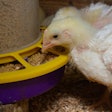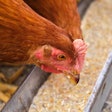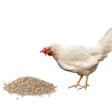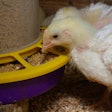
Gut health plays a vital role in nutrition absorption, development of immunity and disease resistance in birds. However, when gut health is compromised, such diseases as necrotic enteritis and coccidiosis can cause major health concerns in a producer’s flock. Those concerns can ultimately impact feed intake and conversion leading to economic losses.
With limited options for disease control, producers need a tailored, well-planned Intestinal Integrity program. An effective program includes careful planning and management strategies. When issues arise, producers can evaluate and adjust their disease prevention program to maintain gut health quickly.
Effective management strategies to improve intestinal integrity
Maintaining an Intestinal Integrity program year-round is essential to help control coccidiosis. As part of an Intestinal Integrity program, producers should walk the barns multiple times per day to encourage movement to feed and drink, which helps establish good gut health from the start.
Producers should also adhere to pest and rodent management as well as proper biosecurity practices in their operations. Farm workers can pick up infectious diseases on their boots and track them into the barns, which can negatively impact the birds’ immune system and reduce their ability to respond to coccidiosis. Poultry barns should have dedicated areas, often outside of the barn, where producers, service techs and visitors can put on protective coveralls and over-boots before stepping in disinfectant powder as they enter the barn.
Select the right intestinal integrity program
There are many options to help control coccidiosis, including ionophores, chemicals, vaccines and antibiotics. A well-planned rotation strategy is essential to ensuring the flock responds to each adjustment. Elanco recommends that producers rotate their anticoccidial program no more than three times per year to help with overall planning, management, gut integrity, bird performance and coccidiosis control.
While vaccine programs are well suited for late spring and summer, producers should consider using their best and most successful programs in the winter. One of the most effective programs uses a chemical and an ionophore. This combination delivers optimal protection to the birds’ Intestinal Integrity.
For instance, Elanco’s portfolio of anticoccidial ionophores are now complemented by non-antibiotic Intestinal Integrity products — the chemical ZoaShieldTM and the potent chemical Clinacox®. Adding ZoaShield and Clinacox provides another rotational option to No Antibiotic Ever (NAE) customers and both conventional broiler and turkey producers.
Manage your flock’s health with intestinal integrity scores
To best manage a flock’s health, producers should consider using the Intestinal Integrity Index (I2), which provides an overall picture or metric of broiler and turkey Intestinal Integrity. I2 scores are calculated within the Elanco Health Tracking System (HTSi), a comprehensive database integrating more than 20 years of data and more than 6,000,000 individual bird post-mortem analyses.
With the assistance of an Elanco Technical Consultant, producers can track and benchmark the health of their birds over time, evaluate a broad range of health conditions and identify potential health issues early. These health and performance insights can be a contributor to data-driven flock health management, helping identify which lesions are causing health issues. This leads to more strategic and targeted interventions.
For example, a posting session may identify intestinal lesions that lower the Index score of a flock from 100 to 90.1 Previous HTSi data analysis has found that a one-point decrease in the score has been shown to drop feed conversion ratio (FCR) by 0.0013. Therefore, an Index score of 90 could indicate a loss of 1.3 points of FCR, which in modern-day production equates to around one cent of additional cost per bird.
Assess results during posting session
Posting sessions will help evaluate a producer’s cocci control program. During a posting session, an Elanco technical consultant evaluates all organ systems. Overall bird health, in addition to gut health, is assessed. Producers can then use this data to make any necessary adjustments to their program.
By partnering with an Elanco Technical Consultant, producers can create a customized Intestinal Integrity program to manage their flock’s health more precisely and effectively.
Producers can contact their Elanco Technical Consultant to learn more about the Intestinal Integrity Index and discuss ways to develop a well-planned Intestinal Integrity program or visit poultry.elanco.com
1. Elanco Animal Health: Findings from multi-year, global study on enteric health revealed at 2016 Poultry Science Association Annual Meeting.
Clinacox, ZoaShield, Elanco and the diagonal bar logo are trademarks of Elanco or its affiliates.
© 2021 Elanco and its affiliates. PM-US-21-1524

















